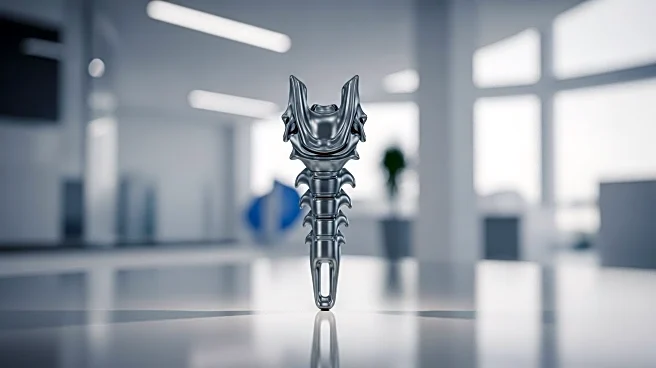What is the story about?
What's Happening?
Centinel Spine, a leading global medical device company, has announced that its prodisc C Vivo and prodisc C Nova Cervical Total Disc Replacement systems have received certification under the European Union's Medical Device Regulation (MDR). This certification marks a significant achievement for the company, as it underscores the safety, quality, and performance of its products in accordance with the highest European standards. The prodisc C Vivo and prodisc C Nova systems are designed to treat cervical spinal disease and have been in clinical use internationally since 2009. The MDR certification process is known for its rigorous requirements, ensuring that medical devices meet stringent regulatory standards. Centinel Spine's CEO, Steve Murray, emphasized the importance of this certification in expanding access to their technologies and improving patient care worldwide.
Why It's Important?
The MDR certification of Centinel Spine's cervical disc replacement systems is a pivotal development in the medical device industry, particularly for companies operating in the spinal health sector. This certification not only validates the safety and efficacy of Centinel Spine's products but also positions the company as a leader in the global market for spinal disease treatment. The certification process is a testament to the company's commitment to maintaining high standards and providing reliable solutions for patients with cervical spinal conditions. For healthcare providers and patients, this means continued access to advanced, clinically-proven technologies that can significantly improve quality of life. The achievement also highlights the growing importance of regulatory compliance in the medical device industry, as companies strive to meet evolving standards and ensure patient safety.
What's Next?
With the MDR certification secured, Centinel Spine is poised to expand its market presence in Europe and potentially other regions that recognize the EU's regulatory standards. The company may focus on increasing the adoption of its prodisc technologies among healthcare providers, leveraging the certification as a competitive advantage. Additionally, Centinel Spine might explore further innovations in its product line to address a broader range of spinal conditions. The certification could also prompt other medical device companies to pursue similar regulatory approvals, potentially leading to increased competition and innovation in the field of spinal health.
Beyond the Headlines
The MDR certification process reflects broader trends in the medical device industry, where regulatory compliance is becoming increasingly critical. This shift is driven by a need to ensure patient safety and product reliability in a rapidly evolving technological landscape. As companies like Centinel Spine navigate these regulatory challenges, they contribute to setting higher industry standards that benefit patients and healthcare systems globally. The focus on compliance may also encourage more rigorous research and development efforts, leading to the creation of more effective and innovative medical solutions.















